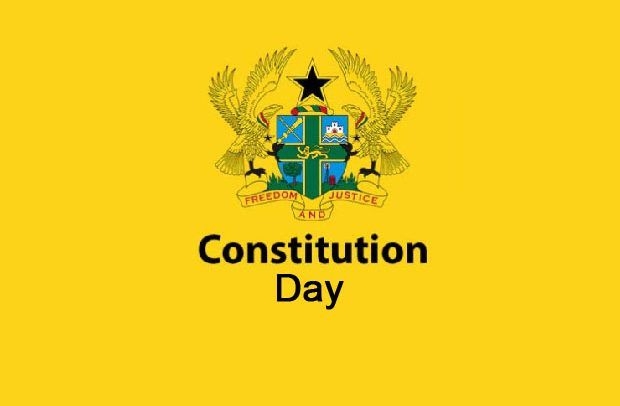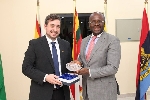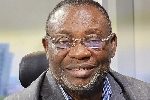Today is Constitution Day
 Constitutional Day
Constitutional Day
Today, Tuesday, 7 January 2019 is Constitution Day, a public holiday set aside to mark the coming into effect of the 1992 Constitution and the birth of the Fourth Republic.
First observed last year, the newly-designated holiday is to remind Ghanaians of their commitment to uphold the tenets of the rule of law, constitutionalism and democracy.
More importantly, the day is to remind the citizens of their collective commitment to a regime of uninterrupted constitutional order.
The 1992 Constitution
The 1992 Constitution came into force on January 7, 1993, after it had been approved in a referendum on April 28, 1992.
It defines the fundamental political principles establishing the structure, procedures, powers and duties of the government, the structure of the Judiciary and the Legislature.
It also states, in very clear terms, the fundamental rights and duties of a citizen.
January 7 subsequent to an election year is also the day Heads of State are sworn into office in Ghana.
The government, last year, presented a bill before Parliament to amend the Public Holidays Act, 2001 (Act 601) to include January 7 as a statutory public holiday.
It made July 1, formerly marked as Republic Day and public holiday, a commemorative day.
Support from political parties
The move received broad-based support from all the political parties, including the National Democratic Congress (NDC), whose Deputy General Secretary, Mr Peter Boamah Otokunor, said at the time: "It is not out of place to celebrate it as a public holiday."
What the party was opposed to at the time was the designation of August 4 and September 21 as Founders' Day and Kwame Nkrumah Memorial Day, respectively.
The Fourth Republic is the most enduring in the country's history, as it has lasted 27 years (and still counting). The first three Republics were cut short by military adventurists who, through coups, ended the governments of ruling civilian Heads of State.
Constitution Day is a marked departure from the kind of holidays the country has had, in the sense that it is to be used to determine how best to use the supreme law of the land to build the Republic and how best all Ghanaians can respect the Constitution and abide by it.
Ghana's main institution responsible for civic education, the National Commission for Civic Education (NCCE), has endorsed the marking of the day as a public holiday and called on citizens to "make the study and application of provisions of the Constitution part of our daily lives”.
"It is then that we can be seen as upholding constitutionalism in Ghana," the Chairperson of the NCCE, Ms Josephine Nkruma, said in a statement last year.
Fourth Republican Presidents
President Jerry John Rawlings was the first President of the Fourth Republic. He assumed power from January 7, 1993, to January 7, 2001, after serving two four-year terms.
The National Democratic Congress (NDC) President then handed over to Mr John Agyekum Kufuor on January 7, 2001. President Kufuor, who came to power on the ticket of the New Patriotic Party (NPP), ended his two terms at the end of 2008.
He was succeeded by Professor John Evans Atta Mills, who was elected on the ticket of the NDC and sworn into office on January 7, 2009. He served for three years, 199 days, before passing on to glory on July 24, 2012.
President Mills’s Vice-President, Mr John Dramani Mahama, was sworn into office the same day to complete the former’s first term.
Mr Mahama then contested the elections in 2012, won and served for four years, before losing it in 2016, having served for a cumulative four years, 167 days.
He was succeeded by the incumbent President, Nana Addo Dankwa Akufo-Addo, on January 7, 2017.
This year's activities
Activities lined up for this year's celebration include a constitutional day lecture, slated for Friday.
The inaugural lecture, on the theme: “Constitutionalism in Ghana’s Fourth Republic: Towards functional performance”, was delivered by the Rector of the Ghana Institute of Management and Public Administration (GIMPA), Professor Philip Ebow Bondzi-Simpson.
Source: graphic.com.gh
Trending News

Don’t use security institutions to intimidate opponents – Bawumia warns Mahama
08:25
KUMACA old students honour Deputy Defence Minister
13:32
DVLA CEO expresses gratitude to former colleagues from SSNIT Trust Towers branch
09:50
Minority petitions Speaker Bagbin over NIB’s attempted arrest of Ntim Fordjour
07:21
CMA pays a fraternal visit to Defence Minister
12:53
Gov't to enforce local procurement policy to boost industry – Ato Forson assures AGI
09:12
Ghana, Czech Republic deepen defence cooperation on day two of President Petr Pavel’s visit
07:15
Ambassador Sam Pee Yalley passes away
11:52
Defence Minister calls out Assin South MP for allegations against Mahama's administration
03:50
MFWA presents gender equality strategy document to PRINPAG
14:16



